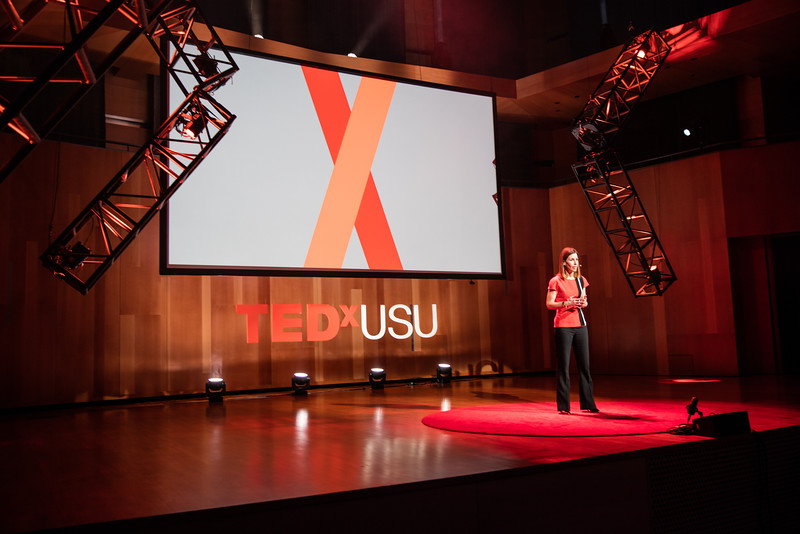TEDxUSU takes off during fourth year
Utah State University hosted TEDxUSU, was organized by the Office of Research and Graduate Studies for the fourth year Friday evening. TEDxUSU was held in the Caine Performance Hall on campus.
TED: Technology, Education, Design converged into 18 minutes or less. TED is a nonprofit organization devoted to ideas worth spreading. The program is offered in 100 different languages and covers topics ranging from medicine to fear to global issues.
TED’s mission statements states, “We believe passionately in the power of ideas to change attitudes, lives and, ultimately, the world.” These talks are supposed to be diverse, yet inspire and create wonder amongst their audiences.
TEDx events are independently organized TED talks in communities around the globe to share ideas on a more intimate level.
To get a tickets for USU’s TEDx event, students and community members had to enter a lottery. Each lottery selectee was emailed a code that would allow them to purchase two tickets. They use this lottery process to avoid a race to the door for tickets and letting anyone who wants to go have a fair chance. There were about 2,000 people that entered the lottery and only 450 tickets were sold.
The TEDx team picked 12 speakers in a three-part session that encapsulated this theme. Speakers can be nominated by students, community members or teachers. Everyone who is nominated is eligible to audition. Auditions last approximately five minutes and are essentially a conversation between the presenters and the TEDxUSU team about their topic.
One of the speakers was Lynne McNeill, a folklorist and professor at USU. Her presentation was called “Folklore doesn’t meme what you think it memes.” She began the talk on her phone, which she put away only after sharing something to Facebook.
McNeill introduced the idea that the Internet in itself is folklore. She believes the internet is a portal that is documenting cultural data. With memes, photos and viral videos about a certain political blunder or new dance move, we can look up exactly how we felt during that time period. The Internet helps us to understand ourselves and be able to look at our daily cultural productions.
“If you spent an hour on the Internet you would think it was a waste of an hour. You wouldn’t feel like that if you were in a museum,” McNeill said.
She told the audience that sophisticated culture — or high culture — isn’t the only worthwhile culture. Her presentation highlighted the duality of folklore and its perceived implications. These implications are not always true and all of us on the web are creating folklore.
Another speaker was Salif Mahamane. He is a current PhD student in the Experimental and Applied Psychological Program at USU. His presentation was called “ADHD sucks, but not really.”
He has struggled with ADHD since he was a kid and had to take criticism about not learning fast enough or not being able to pay attention. He discussed how attention deficit and hyperactivity disorder had blessed his life in many ways. Mahamane liked to refer to himself as an overactive brain stormer who had a lot to offer because his brain could reach in so many directions. He talked about the challenges and his struggle to get where he is today, but he wouldn’t change it for the world.
Mahamane left the audience with a quote that read, “In a world that profits off self-doubt, liking yourself is a rebellious act.” He encouraged the audience to be rebellious and to condone others’ rebellions. The duality of his situation addressed living with ADHD and how it affected his life for good or for bad. He is ADHD and ADHD is him.
All of the speakers covered a wide range of topics that educate and connect the community. This event introduced the extraordinary people on USU’s campus and surrounding areas.
“TEDxUSU has started conversations,” said Dr. Scott Bates, a USU Associate Vice President for Research, and official spokesperson for TEDxUSU. “That’s the most important thing that it can accomplish. When somebody shares a video — be it Angelo Merendino’s talk about recording his wife’s fight with breast cancer from 2015, or Mahamane talking about a new way of thinking about Attention Deficient Hyperactivity Disorder — the impact moves forward. It creates new conversations.”
This year was the time the event was live-streamed. For those students and locals who want to participate in the global conversation and critical thinking, the videos will be uploaded to the TEDxUSU YouTube channel.
— lilywachtor3@hotmail.com

